优品课件之九年级英语下册 unit2--unit4教学案2
牛津深圳版九年级英语下册Unit2Lesson4Grammar(1)教案

九年级下英语 U2 L4 Grammar 教案一、教学材料初三年级下学期,上海教育出版社第二单元,单元主题为 Culture Shock,课型为语法复习课,复习内容为初中阶段学习的七种状语从句。
二、教学内容分析本课是单元第四课时,主要复习了初中阶段的七种状语从句。
本单元的主阅读文篇是一篇演讲稿,中国留学生Brad介绍了他在美国学习、生活的经历以及他对这段经历的感受和收获;行文中使用了多个状语从句,这为状语从句复习做了很好的铺垫;在听说部分,第一部分谈论到了中西传统节日——春节和感恩节之间的相似和不同点,第二部分则是让学生向来中国参加夏令营的外国交流生介绍中国文化体验活动。
写作课是主阅读篇章内容的延续,要求学生以Brad的身份,给其寄宿家庭写一封感谢信。
语法复习课放在阅读和听说课之后、写作课之前。
如果能够在主阅读篇章与听说课所创设的语境和知识能力目标的基础上,设计多种教学任务给学生练习语言知识以及体验状语从句在写作中的运用,这样,不仅可以使状语从句更好地起到“承上启下”的单元教学功能,还能帮助学生复习巩固状语从句的语言知识、提高学生在口头或书面表达中的语法运用能力。
三、学情分析本课的授课对象为初三年级的学生。
这个阶段的学生对状语从句的语法知识有一定的理解和认识,但是对状语从句在写作中的交际功能、语篇功能了解不多。
四、教学目标语言能力:掌握状语从句的类型、各种状语从句常见连词的意义、用法以及运用状语从句时需要注意的事项等相关语法知识。
思维能力:能够借助创设的语境,围绕主题进行发散性思维;能对状语从句在写作中的交际功能、语篇功能进行分析,提高分析、归纳总结的思维能力。
文化品格:能够关注中外文化异同,加深对中国文化的理解。
学习能力:能够尝试运用状语从句描述中国春节、介绍活动计划;能够运用状语从句优化句子表达、完善写作。
五、教学重点、难点教学重点:帮助学生正确使用多种状语从句教学难点:帮助学生理解状语从句的交际与语篇功能,在此基础上能够尝试在写作中恰当使用状语从句来增强表达的逻辑性、条理性和有效性。
优品课件之新目标英语九年级Unit 2全模块教案

新目标英语九年级Unit 2全模块教案课题 Unit 2 I used to be afraid of the dark. Period 1 教学目标1.Knowledge Objects(1)Key Vocabulary:used to, dark(2)Target Language2. Ability Objects(1) Train students’ listening skill.(2) Train students’ communicative competence.3.Moral ObjectDon’t judge a person by his appearance.教材分析1.Teaching Key PointsTarget languageThe structure: used to2. Teaching Difficult PointThe structure: used to实施教学过设计Step Ⅰ Revision(1) Check the homework exercises.(2) Ask some individual students their ways of learning English.T: How do you learn English, A?SA: I learn English by listening to cassettes.T: What about you, B?SB: I study with a group.T: Do you learn English by practicing conversations with friends, C?SC: Yes, I do. I think it helps.T:…Step Ⅱ 1aThe activity introduces tile key vocabulary. Call students’ attention to the chart with the headlines Appearance and Personality.Say, You are to fill in the chart with words describing people. The words under Appearance will describe how people look and the words under Personality will describe what people are like. Ask two students to say the sample answers. Then elicit one answer to each column from the class.Get students to fill in the chart individually.Check the answers by asking different students to read their lists to the class.Make sure that all the students understand what each word means. Note: Answers will vary from the sample answers below. Sample answersAppearance: tall, straight hair, long hair, short hair, curly hair, short, fat, thin, slim, good-looking, pretty Personality: outgoing, funny, quiet, kind, warm-hearted, friendly, shy, easygoingStep Ⅲ 1bThe activity gives students practice in understanding the target language in spoken conversation.Write two dates side by side on the blackboard. The first is today’s date, including the year, and the second is the same day, but ten years ago.Ask a student to stand up. Use words or phrases to describe that student now. Ask students to suggest words Or phrases that describe him/her ten years ago.T: Liu Chang is tall now. Was she tall ten years ago?S1: No, she was short.T: S。
新外研版九年级下册英语 Module 4 Unit 2 教案(教学设计)

Module 4Rules and suggestionsUnit 2 We must keep the camp clean1. Grasp tent, fall, fall asleep, hang, sudden, gun, soft, still, wood, blood and so on2. Go over the use of modal verb1. How to use modal verb to give suggestions2. The use of modal verb教学环节教师活动学生活动备课札记Step 1 Warm up and lead in 1. Show the students thesepictures.2. Ask the students to work inpairs to answer the questions.If you meet them, what should youdo?Have you ever seen bears?Are youafraid of them?What should you do when you seea bear in the wild?1. Understand thesequestions.2. Work in pairs toask and answer thequestions.利用贴近学生生活的话题导入新课,使学生对该课的学习更加感兴趣。
Step 2Learning new words Show the students new words andlead them to read in Unit 2.Follow the teacherto read the wordsand then listen tothem again tocorrect theirpronunciation.让学生跟读、自读新单词, 然后听录音纠正发音。
九年级英语下册unit2--unit4教学案2【DOC范文整理】
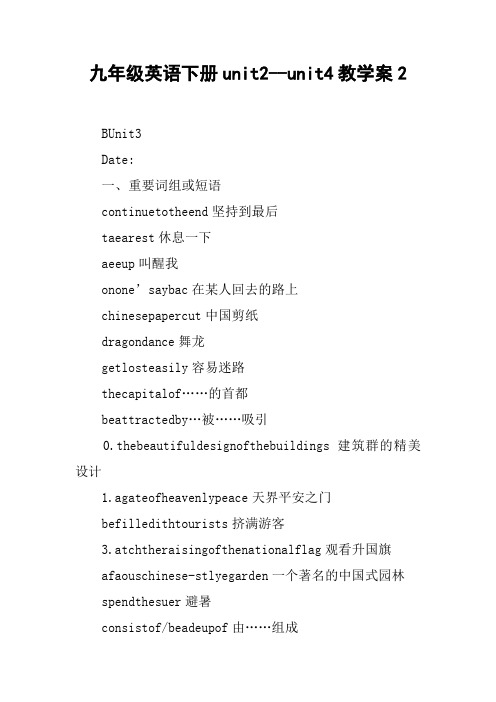
九年级英语下册unit2--unit4教学案2BUnit3Date:一、重要词组或短语continuetotheend坚持到最后taearest休息一下aeeup叫醒我onone’saybac在某人回去的路上chinesepapercut中国剪纸dragondance舞龙getlosteasily容易迷路thecapitalof……的首都beattractedby…被……吸引0.thebeautifuldesignofthebuildings建筑群的精美设计1.agateofheavenlypeace天界平安之门befilledithtourists挤满游客3.atchtheraisingofthenationalflag观看升国旗afaouschinese-stlyegarden一个著名的中国式园林spendthesuer避暑consistof/beadeupof由……组成aan-adelae一个人工湖alloverthearea遍及这个地区runorethan5,000iloetresacrossnorthernchina横跨中国北方绵延5000多里0.oneoftheondersoftheorld世界几大奇迹之一1.exerienceitsbeautyandgreatness体验它的美和伟大2.stepbystep一步一步地3.inthesouthofchina在中国的南部lieonthetosidesofLiRiver座落在漓江两岸indifferentshapes形态各异instrangeshapes奇形怪状see...ithone’soneyes亲眼所见taeaboattripalongLiRiver乘船沿漓江游览beopentothepublic向公众开放0.atsunrise在日出时刻gethotandseaty又热又流汗everyfiveinutes每五分钟3.inahurry匆忙地leavejapanforotherAsiancountries离开日本去亚洲其他国家publictransportservices公交设施ishsb.anicetrip祝某人旅途愉快二、重点句子及句型:Beijingisinnorthernchina.北京在中国的北部。
外研版九年级英语下册教学设计 Module 4 Unit 2
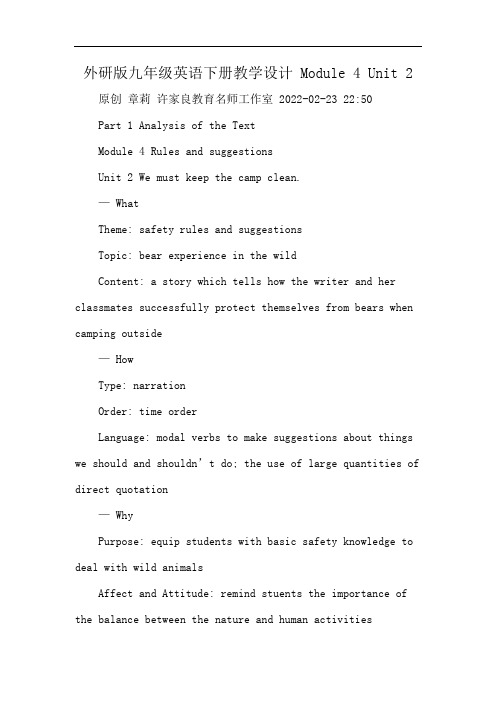
外研版九年级英语下册教学设计 Module 4 Unit 2 原创章莉许家良教育名师工作室 2022-02-23 22:50Part 1 Analysis of the TextModule 4 Rules and suggestionsUnit 2 We must keep the camp clean.— WhatTheme: safety rules and suggestionsTopic: bear experience in the wildContent: a story which tells how the writer and her classmates successfully protect themselves from bears when camping outside— HowType: narrationOrder: time orderLanguage: modal verbs to make suggestions about things we should and shouldn’t do; the use of large quanti ties of direct quotation— WhyPurpose: equip students with basic safety knowledge to deal with wild animalsAffect and Attitude: remind stuents the importance of the balance between the nature and human activitiesPart 2 Analysis of the LearnersAwareness of the topic: lack of background information about wild bears; lack of basic safety knowledge about dealing with bearsLanguage basis and reading skills: already have some language basis and reading skills, such as predicting, skimming, and scanningDiscourse understanding: have difficulty in understanding the text as a discoursePart 3 Teaching ObjectivesBy the end of the lesson, students will be able to:1. acquire background knowledge about bears and detailed information about the writer’s bear experie nce (Learning and Understanding)2. conclude rules and suggestions on how to deal with bears in the wild (Learning and Understanding)3. analyze and understand the reasons behind the rules and suggestions given each time in the text (Applying and Practising)4. explore the good qualities of the writer and pay attention to the importance of environmental protection when camping in the wild (Transforming and Creating)5. internalize the text by reviewing the text with the help of an information map (Applying and Practising)6. discuss and create a poster in groups on how to deal with other wild animals (Transforming and Creating) Part 4 Important and Difficult PointsImportant Points:1. acquire background knowledge about bears anddetailed information about the writer’s bear experience (Learning and Understanding)2. conclude rules and suggestions on how to deal with bears in the wild (Learning and Understanding)3. analyze and understand the reasons behind the rules and suggestions given each time in the text (Applying and Practising)Difficult Points:4. explore the good qualities of the writer and pay attention to the importance of environmental protection when camping in the wild (Transforming and Creating)5. internalize the text by reviewing the text with the help of an information map (Applying and Practising)6. discuss and create a poster in groups on how to deal with other wild animals (Transforming and Creating)Part 5 Teaching Methods and AidsTeaching MethodsPWP teaching method;Task- based teaching method;Communicative teaching methodTeaching AidsBlackboard, multimedia, pictures,a handmade poster, some red flash cardsPart 6 Teaching ProceduresPre-reading1. Lead-inA. Pictures of bearsQ1: What do you think of bears?--- cartoon bears (lovely, cute, funny)Q2: What do you think of them now?--- wild bears (huge, dangerous, wild)(Aim: Lead in the topic; Let students feel the contrast between real bears and friendly cartoon bears.)B. A video about wild bearsQ1: What can they do?Bears can climb trees, smell things from a long way away and run very fast.Q2: What do they eat?They eat fish, honey, meat, plants and almost everything.(Aim: Equip students with more background information about the living habit of wild bears.)2. PredictionLook at the picture on Page 28 and the title of the text, and predict:Q: What happened to the writer?She met bears when she was camping in the forest.Tip: Pay attention to the picture and the title to get the main idea of the text.(Aim: To get the main idea of the text by predicting.) While-reading1. Read for the gistGo through the text quickly and find out the answers to the following questions.Q1: How many days did they stay in the forest? 14 days.Q2: How can we divide the text into 3 parts?Tip: Pay attention to the first sentence of the paragraph to get the timeline.(Aim: To get the structure and the writing order of the text by scanning and skimming.)2. Read for detailed informationA. Table fillingB. QuestionsQ1: How do you understand the phrase “make sudden moves”? ( B )A. move slowlyB. move suddenlyC. move quicklyQ2: Why should they hang their food in the tree?Because bears can climb trees.Why must they keep the camp clean?Because bears can smell things.Why mustn’t the writer run?Because bears can run very fast.Tip: Try to guess the meaning of the new words and phrases in the sentence.(Aims: To get the detailed information of the text; To understand the reasons behind the suggestions by analyzing.)C. ConclusionAfter reading, can you conclude how to act in the following situations and give suggestions? (should/must/can/ mustn’t/ can’t/ shouldn’t)How to avoid a bear? ①②③How to survive a bear? ①②③3. Revision4. Read and ThinkQ1: Why do you think bears came to their camp?Maybe they camped in the wrong place and disturbed the bears;Maybe they didn’t clean up the camp and left a lot of rubbish.Q2: What do you think is the most important thing that we can learn from the writer from her bear experience?We should keep calm and be brave.We can’t act alone in the wild.(Aims: To encourage critical and creative thinking;To accomplish morality aim and make them know the importance of the balance between nature and human activities.Post-reading1. Make a poster: Watch out for _____!Hundreds of visitors go hiking and camping in Dashu Mountain every day. Work in groups to make a poster to let more people know how to protect themselves from bees,sna kes and wild pigs. And don’t forget to tell them to protect the environment while enjoying themselves.Requirements:Each group can only choose one animal;List 2 or 3 rules and suggestions for environmental protection and self-protection on the poster, and make it noticeable to let more people know how to act.Present your poster as a team and explain the reasons behind the rules.(Aims: Accomplish knowledge migration;Make students learn to solve problems with the things they learned in the lesson;Have students learn to help each other and work as a team to finish the task.)2. HomeworkFind more information about survival rules for meeting wild animals outside and share your findings with us next time.Get to know what is “ecotourism” and what we shoul d do to be a responsible tourist.(Aims: Encourage students to find more information by themselves and broaden their horizons;)。
优品课件之九年级英语全册Unit 2 I think that mooncakes are delicious教案(共5套人教新目标版)

九年级英语全册Unit 2 I think that mooncakes are delicious教案(共5套人教新目标版)Unit 2 I think that mooncakes are delicious! Section A 1a―2d 【Study-aims】知识目标:能够识记单词:mooncake, lantern, stranger, relative, pound ;正确使用短语:a little , put on, In two weeks, be similar to, visit one’s relatives ;注意几个节日的表达:the Water Festival, The Dragon Boat Festival ,the Spring Festival, the Lantern Festival ;掌握句型I know that the Water Festival is really fun . I wonder if they ’ll have the races again next year .I wonder whether June is a good time to visit Hong Kong . I believe that April is the hottest month in Thailand.等宾语从句的表达及感叹句What a great day ! How pretty the dragon boats were!的用法。
能力目标:能听懂有关描述节日活动的对话,并学会用所学内容谈论节日活动。
情感目标:培养学生积极参与活动的兴趣,发扬我国的光荣传统。
学习策略:综合培养学生与别人交流和沟通的能力。
文化意识:了解中西方的重要节日及风俗习惯,尊重各地的文化差异。
【Key & difficult points】学习并掌握宾语从句(I)和感叹句的用法。
优品课件之Unit 4 Drawing in the park教案(Period 2)

Unit 4 Drawing in the park教案(Period 2)Unit 4 Drawing in the park教案(Period 2)教学内容 Fun time 教学目标 1. 能够熟练说出公园里的一些物品词汇tree, flower, boat, river, hill, lake等。
2. 能用句型What can you see? I can see a …谈论所见。
3. 能用句型What can you do? I can … 进行调查会做的事情,能用句型He/She can …对他人进行描述。
4. 能编写完整小故事:Let’s be friends.并试着表演。
教学重点 1. 能够熟练说出公园里的一些物品词汇tree, flower, boat, river, hill, lake等。
2. 能用句型What can you do? I can … 进行调查会做的事情,能用句型He/She can …对他人进行描述。
教学难点能编写完整小故事:Let’s be friends.并试着表演。
教学准备故事填写学习单词 PPT 教学过程 Step 1. Warming up & Free talk 1. Enjoy the song: Row your boat 歌词:Row, row, row your boat, gently on the stream, merrily, merrily, merrily, life is interesting. 2. T: Life is interesting. Last lesson, we went to the park. Today, we will go to another interesting place �C Dream Theatre. Let’s go. 3. T: Look! They need some actors for the new play. Do you want to have a try? T: And we should pass four tests. 出示招聘演员条件: 1. 表演力测试关。
英语:Module4 Unit2 教案2(外研社九年级下)
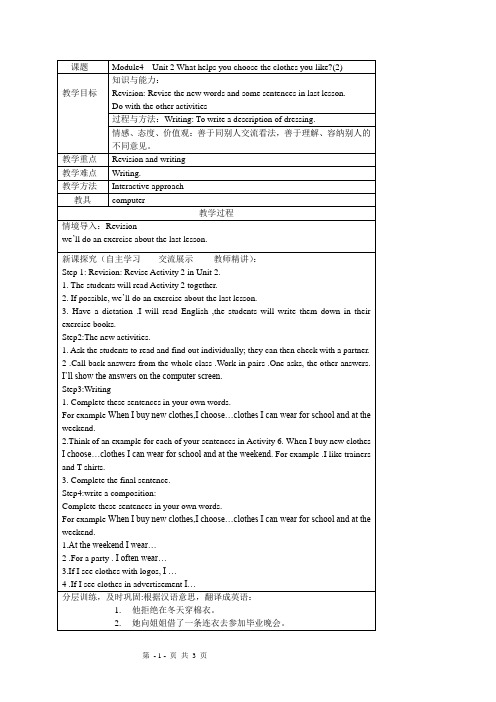
When I first took skiing lessons,I found it exciting.For ski racing,
there’s no question I'm better shape than most guys(小伙子).I think it’s fun.I
Joe Miller 16 year’s old America
I’m proud of doing things my own way.So whether somebody wants me
to do something or whatever it is,I feel like they’re all other people’s thoughts,
2.Think of an example for each of your sentences in Activity 6. When I buy new clothes I choose…clothes I can wear for school and at the weekend. For example .I like trainers and T-shirts.
( )65.Why does An Qi want to be a country schoolteacher?
A.Because she wants to travel.
B.Because her parents are teachers.
C.Because she loves children very much
作业设计:Emily Urich 18 years old Canada
九年级英语北师大版全一册Unit2Lesson4Classics(第二课时)教学设计

4.利用网络资源或图书馆,搜集关于世界各地的经典作品的信息,制作一份精美的手抄报,要求涵盖作品名称、作者、创作背景、主要内容等,以展示经典文化的魅力。
4.提高学生的阅读理解能力,培养他们通过阅读获取信息、解决问题的能力。
(二)过程与方法
在本节课的教学过程中,教师将采用以下方法引导学生掌握相应的知识和技能:
1.通过小组合作、讨论的方式,让学生自主探究课文内容,提高他们的自主学习能力。
2.利用多媒体教学资源,如图片、视频等,激发学生的学习兴趣,帮助他们更好地理解和记忆词汇和句型。
(1)利用图片、实物等直观教具,帮助学生形象地记忆和理解词汇。
(2)设计词汇接龙、小组竞赛等游戏,激发学生的学习兴趣,巩固所学词汇。
(3)通过例句展示和实际语境练习,让学生熟练掌握词汇的用法。
2.针对语法时态的教学,我将采用以下设想:
(1)通过故事、情境创设等方式,让学生在实际语境中感受和运用一般现在时和一般过去时。
1.学生在上一课时已经对“Classics”这一主题有了一定的了解,但对于经典作品的深入探讨和评价能力仍需提高。
2.学生在英语词汇方面,对于一些专业术语和抽象概念的表达还不够熟练,需要教师在课堂上进行引导和拓展。
3.学生在阅读过程中,对于文章主旨和细节的理解能力有待提高,需要教师在教学中注重培养他们的阅读策略和技巧。
5.学生观看一部与经典作品相关的电影,如《罗密欧与朱丽叶》、《傲慢与偏见》等,比较电影与原著之间的差异,并撰写一篇不少于300词的观后感。
(三)学生小组讨论
优品课件之九年级英语下册Module2Education导学案2
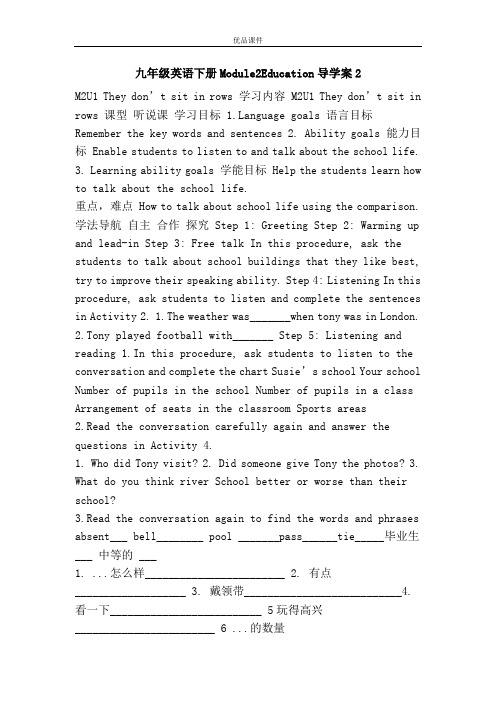
九年级英语下册Module2Education导学案2M2U1 They don’t sit in rows 学习内容M2U1 They don’t sit in rows 课型听说课学习目标 nguage goals 语言目标Remember the key words and sentences 2. Ability goals 能力目标 Enable students to listen to and talk about the school life.3. Learning ability goals 学能目标 Help the students learn how to talk about the school life.重点,难点 How to talk about school life using the comparison. 学法导航自主合作探究 Step 1: Greeting Step 2: Warming up and lead-in Step 3: Free talk In this procedure, ask the students to talk about school buildings that they like best, try to improve their speaking ability. Step 4: Listening In this procedure, ask students to listen and complete the sentences in Activity 2. 1.The weather was_______when tony was in London.2.Tony played football with_______ Step 5: Listening and reading 1.In this procedure, ask students to listen to the conversation and complete the chart Susie’s school Your school Number of pupils in the school Number of pupils in a class Arrangement of seats in the classroom Sports areas2.Read the conversation carefully again and answer the questions in Activity 4.1. Who did Tony visit?2. Did someone give Tony the photos?3. What do you think river School better or worse than their school?3.Read the conversation again to find the words and phrases absent___ bell________ pool _______pass______tie_____毕业生___ 中等的 ___1. ...怎么样________________________2. 有点___________________ 3. 戴领带___________________________4. 看一下__________________________ 5玩得高兴________________________ 6 ...的数量____________________________ 7. 按排座_____________________ 8. 围着桌子坐_________________________Step 6: Language notes 1.What’s ...like 。
九年级英语下册unit2unit4教学案2
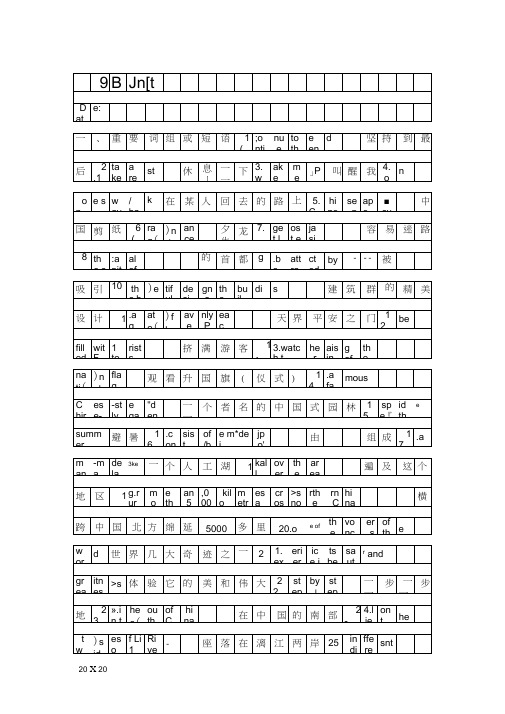
ili ng
-
尽
管
他
的
话
她
听
不
懂
一一一
个
字
她
还
是
一一一
直
微
笑
着
。
③(hou
gh
可
以
用
于
句
末
alt
houg
jh
则
不
可
以
。
如
:
She
!kne
jwa
l hei
-frie
nds
wou
d be
the
e, s
he d
idn
't、
want
toc
J
o,
the
ugh
她
知
道
她
的
所
有
朋
友
都
会
出
席
但
是
她
自
己
不
想
去
。
向
公
众
开
放
-30
).at s
unri
se
在
日
出
时
刻
31
.get
hot
and
swe.
aty
又
热
又
流
汗
32
.eve
ry fi\
,e m
inute
js
每
五
分
钟
3:
kin <
3 hu
ry
匆
忙
地
34.
eaw
e Ja
pan
or o
北师大版九年级英语全册教学设计Unit 2 Lesson 4教案
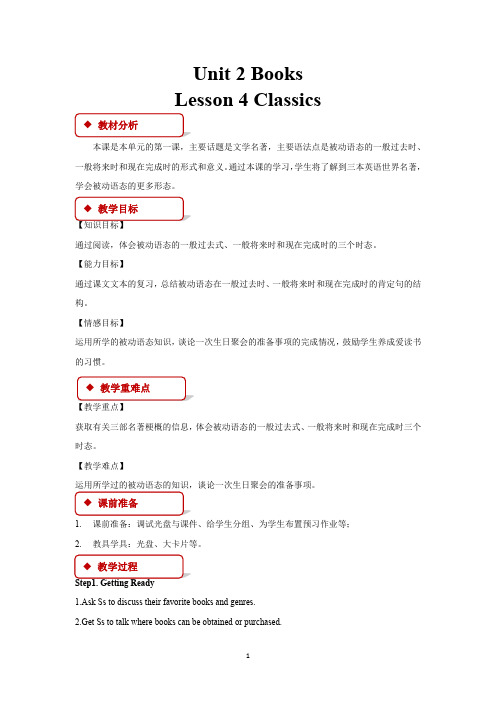
Unit 2 BooksLesson 4 Classics本课是本单元的第一课,主要话题是文学名著,主要语法点是被动语态的一般过去时、一般将来时和现在完成时的形式和意义。
通过本课的学习,学生将了解到三本英语世界名著,学会被动语态的更多形态。
通过阅读,体会被动语态的一般过去式、一般将来时和现在完成时的三个时态。
【能力目标】通过课文文本的复习,总结被动语态在一般过去时、一般将来时和现在完成时的肯定句的结构。
【情感目标】运用所学的被动语态知识,谈论一次生日聚会的准备事项的完成情况,鼓励学生养成爱读书的习惯。
【教学重点】获取有关三部名著梗概的信息,体会被动语态的一般过去式、一般将来时和现在完成时三个时态。
【教学难点】1. 课前准备:调试光盘与课件、给学生分组、为学生布置预习作业等;2. 教具学具:光盘、大卡片等。
1.Ask Ss to discuss their favorite books and genres.2.Get Ss to talk where books can be obtained or purchased.3.Match the writers(1-4) with the book titles (a-d) according to the encyclopedic knowledge. Step2. Reading1.Let students talk about what books they have read, which one is the favorite, and the reason.2. Get students to read the text, and find what books are mentioned in the text.3. Read the passages and fill in the information tables about books.4. Let students read the passages and answer the questions in the exercise 3.5. Ask students to listen and read the passages after the speaker and underline the words that you couldn’t understand clearly with pencils.6. Students work in pairs to talk about the Chinese meaning of the words and sentences that you underlined.7. Get students to read the three texts to find which book each sentence in exercise 3 is about. Step3. New works1.Let students read the following words in English.2. Tell the Chinese meaning of the words in the slide.3. Emphasize that body language is the most important form of communication.Step4. Language points1. character CN.人物; 性格,个性;特点2. orphan CN.孤儿;3. curiosity CN. 好奇心;求知欲out of curiosity 出于好奇心4. get sb. into trouble with sb. 使某人和某人发生冲突5. be used to sth. 习惯于6. upset v.使心烦意乱;使生气;使心情不好upset adj.心烦的;苦恼的;沮丧的7. live off 依赖什么生活8. get along with sb. 和某人和睦相处9. have trouble doing sth. 做某事有困难Step5. Pair-workGet students to work in pairs to introduce the three classics in their own words.Example:The Adventures of Tom Sawyer was one of Mark Twain’s books. The main characters of the book were an orphan named Tom and a boy named Huckleberry Finn. The book includes dialogues that show how language was spoken at the time. It has remained a popular and important book since it was first published in 1876.Step6. Grammar1. Let students to find the similar parts from the two sentences.2. Ask students to find more similar sentences in the texts.3. Students observe the sentences and draw a conclusion.4.Teach students the structures of the passive mood at Simple Future, Simple Past, and Present Perfect.5.Introduce the transformation between the subjective mood and the passive mood and let students do the relevant drills.Step7. SpeakingGroup work: Imagine you are going to have a birthday party.What preparations have been done? Please make sentences.hang up the decorationsmake the cakebuy foodtake out the platesput flowers on the tableput candles on the cakeStep8. Writing假如这个周日是你的生日,你会请你的妈妈帮忙做准备工作。
人教版英语九年级全册Unit2 Period4 精品教案
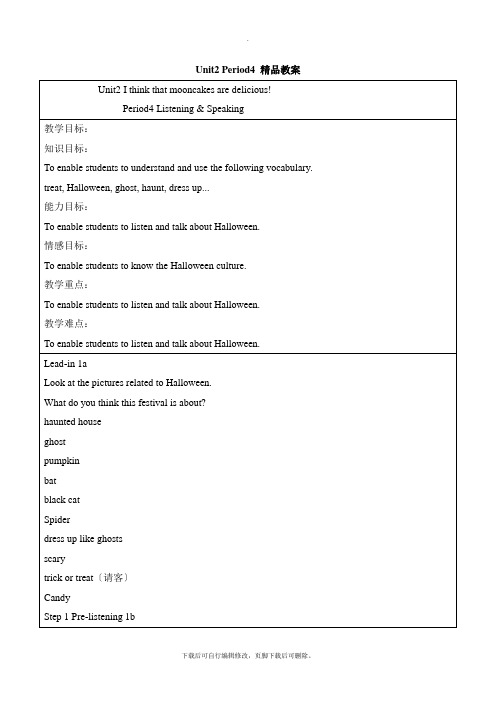
Unit2 I think that mooncakes are delicious!
Period4 Listening & Speaking
教学目标:
知识目标:
To enable students to understand and use the following vocabulary.
1 Where is Halloween popular?
In North America.
2 When do people celebrate Halloween?
On Oct. 31.
3 What does Wu Yu think of this festival?
It sounds a little scary, but it’s a fun festival.
Step 3 Pre-listening 1c
What do people do to celebrate Halloween? Try to fill in the blanks before listening again.
1 Many people make their ____look scary. they may_________ the lights and light candles. They sometimes also put things like spiders and ghosts around the doors and ________.
What do you think this festival is about?
haunted house
ghost
优品课件之九年级英语下册 unit2--unit4教学案3
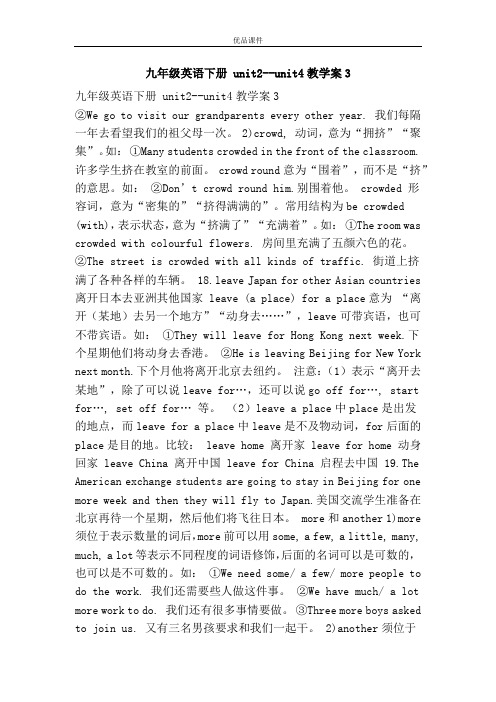
九年级英语下册 unit2--unit4教学案3九年级英语下册 unit2--unit4教学案3②We go to visit our grandparents every other year. 我们每隔一年去看望我们的祖父母一次。
2)crowd, 动词,意为“拥挤”“聚集”。
如:①Many students crowded in the front of the classroom. 许多学生挤在教室的前面。
crowd round意为“围着”,而不是“挤”的意思。
如:②Don’t crowd round him.别围着他。
crowded 形容词,意为“密集的”“挤得满满的”。
常用结构为be crowded (with),表示状态,意为“挤满了”“充满着”。
如:①The room was crowded with colourful flowers. 房间里充满了五颜六色的花。
②The street is crowded with all kinds of traffic. 街道上挤满了各种各样的车辆。
18.leave Japan for other Asian countries 离开日本去亚洲其他国家 leave (a place) for a place意为“离开(某地)去另一个地方”“动身去……”,leave可带宾语,也可不带宾语。
如:①They will leave for Hong Kong next week.下个星期他们将动身去香港。
②He is leaving Beijing for New York next month.下个月他将离开北京去纽约。
注意:(1)表示“离开去某地”,除了可以说leave for…,还可以说go off for…, start for…, set off for… 等。
(2)leave a place中place是出发的地点,而leave for a place中leave是不及物动词,for后面的place是目的地。
优品课件之Unit 2 Be helpful at home
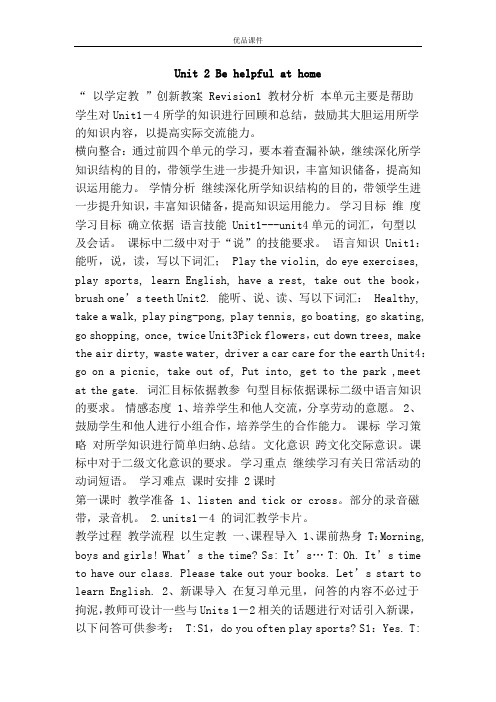
Unit 2 Be helpful at home“ 以学定教”创新教案 Revision1 教材分析本单元主要是帮助学生对Unit1―4所学的知识进行回顾和总结,鼓励其大胆运用所学的知识内容,以提高实际交流能力。
横向整合:通过前四个单元的学习,要本着查漏补缺,继续深化所学知识结构的目的,带领学生进一步提升知识,丰富知识储备,提高知识运用能力。
学情分析继续深化所学知识结构的目的,带领学生进一步提升知识,丰富知识储备,提高知识运用能力。
学习目标维度学习目标确立依据语言技能 Unit1---unit4单元的词汇,句型以及会话。
课标中二级中对于“说”的技能要求。
语言知识 Unit1:能听,说,读,写以下词汇; Play the violin, do eye exercises, play sports, learn English, have a rest, take out the book,brush one’s teeth Unit2. 能听、说、读、写以下词汇: Healthy, take a walk, play ping-pong, play tennis, go boating, go skating, go shopping, once, twice Unit3Pick flowers,cut down trees, make the air dirty, waste water, driver a car care for the earth Unit4:go on a picnic, take out of, Put into, get to the park ,meet at the gate. 词汇目标依据教参句型目标依据课标二级中语言知识的要求。
情感态度 1、培养学生和他人交流,分享劳动的意愿。
2、鼓励学生和他人进行小组合作,培养学生的合作能力。
课标学习策略对所学知识进行简单归纳、总结。
2024年人教版英语九年级下册Unit2第四课时-课件
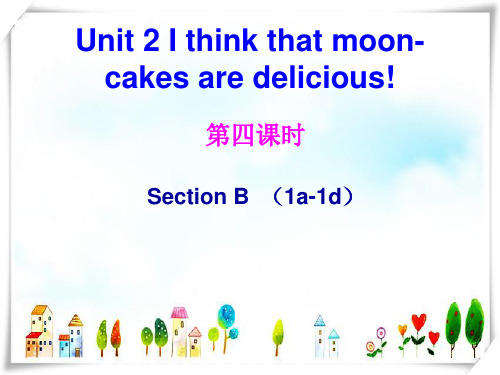
§课堂导学方案---Step 2/1a
§课堂导学方案---Step 2/1b
In North America On October 31st It’s fun to dress up as cartoon characters!
§课堂导学方案---Step 2/1c
put on
tricks serve
4. Mary was frightened because she found a big _s_p_id_e_r___ (蜘蛛)on her bed.
5. Tom can make some kinds of _tr_ic_k_s__ (把戏) to make us laugh..
§课堂导学方案---Step1情景导入
Unit 2 I think that mooncakes are delicious!
第四课时
Section B (1a-1d)
§自主学习方案----【新词自查】
根据首字母提示完成单词。
1. Nobody but Jim is brave enough to enter into the _h_a_un_t_e_d_ (闹鬼的)house.
2. Nowadays, many students like to read the stories of the _g_h_o_s_ts_ (鬼)and witches
3. Ted was unhappy because his parents always _t_r_ea_t_e_d_ (看待)him as a child.
绩 ,
八
分
方
法
。
愿
全
天
下
所
有
- 1、下载文档前请自行甄别文档内容的完整性,平台不提供额外的编辑、内容补充、找答案等附加服务。
- 2、"仅部分预览"的文档,不可在线预览部分如存在完整性等问题,可反馈申请退款(可完整预览的文档不适用该条件!)。
- 3、如文档侵犯您的权益,请联系客服反馈,我们会尽快为您处理(人工客服工作时间:9:00-18:30)。
九年级英语下册 unit2--unit4教学案29B Unit 3Date:一、重要词组或短语 1.continue to the end 坚持到最后 2.take a rest 休息一下 3.wake me up 叫醒我4.on one’s way back在某人回去的路上 5.Chinese paper cut 中国剪纸 6.dragon dance 舞龙 7.get lost easily 容易迷路8. the capital of ……的首都9.be attracted by … 被……吸引 10.the beautiful design of the buildings 建筑群的精美设计 11.a gate of heavenly peace 天界平安之门 12.be filled with tourists 挤满游客 13.watch the raising of the national flag 观看升国旗(仪式) 14.a famous Chinese-stlye garden 一个著名的中国式园林 15.spend the summer 避暑 16.consist of /be made up of 由……组成 17.a man-made lake 一个人工湖 18.all over the area 遍及这个地区19.run more than 5,000 kilometres across northern China 横跨中国北方绵延5000多里 20.one of the wonders of the world 世界几大奇迹之一 21.exerience its beauty and greatness 体验它的美和伟大 22.step by step 一步一步地 23.in the south of China 在中国的南部 24.lie on the two sides of Li River 座落在漓江两岸 25.in different shapes 形态各异 26.in strange shapes 奇形怪状27.see ... with one’s own eyes 亲眼所见 28.take a boat trip along Li River 乘船沿漓江游览 29.be open to the public 向公众开放 30.at sunrise 在日出时刻 31.get hot and sweaty 又热又流汗 32.every five minutes 每五分钟 33.in a hurry 匆忙地34.leave Japan for other Asian countries 离开日本去亚洲其他国家 35.public transport services 公交设施 36.wish sb. a nice trip 祝某人旅途愉快二、重点句子及句型: 1.Beijing is in northern China. 北京在中国的北部。
2.Unless you have a map, you will get lost easily. 除非你有地图,否则你很容易迷路。
3.The emperors of the Ming and Qing dynasties used to live here. 明清两代皇帝以前住在这里。
4.You will be attracted by the beautiful design of the buildings, and the clothes and furniture that the emperors used in the past. 你会被建筑群漂亮的设计,以及过去皇帝们穿过的服装和用过的家具吸引。
5.It is the biggest square in the world and is always filled with tourists. 这是世界上最大的广场,游人如织。
6.Every day many tourists gather here early in the morning so that they can watch the raising of the national flag. 每天,许多游客为了观看升国旗,一大早就聚集在这里。
7.It consists mainly of a hill and a man-made lake, with bridges, pagodas and halls all over the area. 它主要是由一座小山和一个人工湖组成,里面到处建有桥、塔和厅堂。
8.It is a long wall which runs more than 5,000 kilometres across northern China.它是一道蜿蜒五千公里横跨中国北方的很长的城墙。
9.You can experience its beauty and greatness although it is very tiring to climb it step by step.虽然一步一步爬上去非常累,但你可以体验它的美丽和雄伟。
10.You cannot imagine how amazing they are unless you see them with your own eyes. 如果你没有亲眼看到它们,就不能想象它们是多么令人惊异。
Notes:语法讲解 Date:1.although引导的让步状语从句 1)although相当于though, 两词都是连词,引导让步状语从句。
如:①Although/Though she’s young, she knows a lot. =She’s young, but she knows a lot. 尽管她年龄小,她却懂得很多。
②Although/Though h e is in poor health, (yet) he works hard. =He’s in poor health, but he works hard. 虽然他身体不好,但他还是努力工作。
③I’ll never give up English though it is difficult. =English is difficult, but I’ll never give it up. 虽然英语很难,但是我不会放弃的。
注意:①连词although和though引导让步状语从句,主句前不能再用but,但有时可以用副词yet或still。
②当加强语气时,我们通常说even though,而不说even although。
如: Although/ Though/ Even though she didn’t understand a word of what he said, she kept smiling. 尽管他的话她听不懂一个字,她还是一直微笑着。
③though可以用于句末,although则不可以。
如: She knew all her friends would be there, she didn’t want to go, though. 她知道她的所有朋友都会出席,但是她自己不想去。
2) even though意为“即使”、“尽管”、“纵然”,与even if意义相同,也引导让步状语从句。
如:①Even though he’s very nice, I don’t really trust him. 尽管他很好,我并不真正信任他。
(事实上“很好” )②Even if you are not fond of flowers, you shouldn’t miss the flower exhibition.即使你不喜欢花,这次花展你也不应错过。
(假想“不喜欢” )③She won’t leave the television set, even though her husband is waiting for his supper.纵使她丈夫在等着吃晚饭,她也不愿意离开电视机。
④I’ll get there even if I have to sell my watch to get the railway fare.即使我必须卖掉手表去买火车票,我也要到那里去。
注意:让步状语从句通常与一般现在时或一般过去时连用。
2.unless引导的条件状语从句。
由于unless具有否定意义,因此它引导的是个否定的条件(如果……不)。
可以把它看作是if…not的同义表达手段。
如:①Unless he comes… = If he doesn’t come… 如果他不来…… ②Unless you work hard, you will fail. = If you don’t work hard, you will fail. 如果你不努力工作,你会失败的。
注意:unless从句,如同if从句一样,也要用一般现在时代替一般将来时。
如:①Unless it rains, we’ll go hiking.如果不下雨,我们将去远足。
②Unless he comes, I’ll go instead of him.如果他不来,我将代替他去。
3. so that引导的目的状语从句 1)so that引导目的状语从句,从句中通常带有can, could, may, might, should等情态动词,以适用于目的。
如:①They worked very hard so that they could finish the work before supper. 他们拼命地干,想在晚饭前就把工作干完。
②He walked by the side of the road so that he would not be hit by cars. 他在马路边行走,以免被车碰了。
注意:(1)so that从句如为否定结构,则谓语动词中多用情态动词。
(2)so that引导的目的状语从句,可转换成in order that引导的目的状语从句。
若从句主语与主句主语一致,还可用in order to (do) 或so as (to do) 改成同义简单句。
如:They worked very hard so that they could finish the work before supper. = They worked very hard in order that they could finish the work before supper. = They worked very hard in order to finish the work before supper. = They worked very hard so as to finish the work before supper. 2)so that引导的状语从句也可表示结果,这时so that从句中根据句意可用或不用情态动词。
